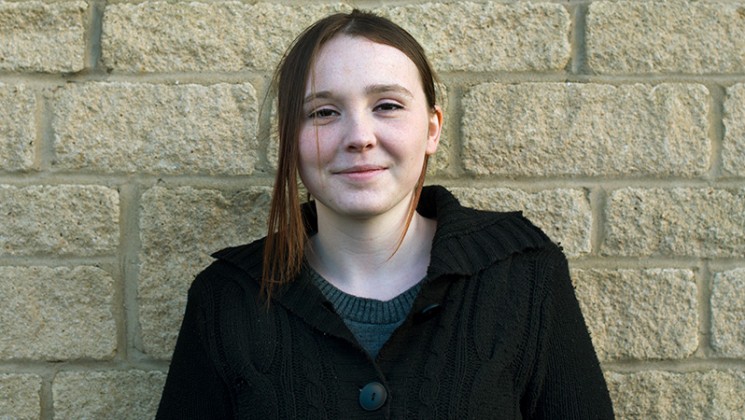Not yet 20 years old, not quite five foot five, Nicky Sutton is a home care support worker in rural Oxfordshire. This slim, gentle teenager works helping elderly and disabled people wash, eat, go to the toilet, take medication, replace catheters and change stoma bags. She is sometimes called on to provide end-of-life care.
“It’s not nice, seeing them deteriorate,” she says. “But I get good satisfaction from my job because you know you’re helping someone live at home right to the end. They don’t have to leave everything they’ve known and loved. They’re where they want to be, and you can make sure their last moments are comfortable. That makes me feel good.”
Nicky has been doing this job for only three months, having previously worked in a nursery. Yet already she talks quite matter-of-factly about sensitive and specialised tasks, like stoma bags and catheters.
For all this Nicky gets paid around £500 per month. The pay is unpredictable because, although she has to be available for work from 7am to 10pm on her allotted days, she won’t know how many of those hours will be filled from week to week.
In addition, she is only paid for the contact time with the client. If she is given a series of 15-minute calls with half an hour’s driving time between, she will earn considerably less than if she is asked to stay with a client for a whole morning. She has to phone into the office from the client’s phone when she arrives and when she leaves, and let them know if she is running late, and why. For the miles of country roads she covers she is paid 30p per mile.
But having been made redundant from the nursery she worked in at the end of last year, and realistic about soaring levels of unemployment for young people, Nicky is focusing on the positive.
“The worst thing about the job is usually finding somewhere to park,” she laughs. “The rest of it you get used to very quickly. We have a five-day induction before we go out, which covers everything. There’s always someone in the office for you to call if you have a problem. The main motto is: ‘Wash your hands and ring the office’.”
Media storm
We’re speaking days after another storm has erupted in the media about poor standards of care in the profession. “We haven’t had the best coverage, and it makes our job harder,” she says. But Nicky gives a very different picture.
She talks enthusiastically about the people she looks after, who live all across the county from caravan parks to villages to the city of Oxford itself, and range from farmers to retired academics and even a former professional footballer.
“Some of the stories you hear, once they get to know you – it’s absolutely brilliant. You can never say it’s a boring job – there’s always something different,” she says.
But it still means trying to live on £500 a month. In affluent Oxfordshire, house prices and rents are twice the national average. But not all of the county’s residents are from wealthy backgrounds. At home in her parents’ house, Nicky still shares a room with her 18-year-old sister.
So she stays sometimes with her boyfriend and his grandfather in the picture-postcard village of Little Milton. The couple were childhood sweethearts – he was 13 and she was 11 when they started going out together. He’s a stonemason from a family of stonemasons.
Life isn’t quite the rural bliss it sounds. Despite his artisan skills, Nicky’s boyfriend has been struggling to make a living, even in the construction trade. “He’s just had to give in – he didn’t want to, but he couldn’t afford it any more. He’s had to go on the dole.”
Priced out of a home
Surviving on £500 a month isn’t easy. A car is essential for Nicky’s job (there is only one bus every two hours into central Oxford from Little Milton) and she spends up to £80 per week on diesel, £156.65 car insurance a month and £76.90 tax every six months. She also needs a phone contract, which costs £35 per month. That leaves around £70 per month for everything else.
“The idea of me owning, or even renting a place on my own is impossible,” she says. She recently looked at a studio flat in the cheaper part of Oxford which was £1,000 a month to rent.
“I haven’t had a haircut for a year,” she says cheerfully. “New clothes are a thing of the past. And although I smoke I can only afford one pouch of tobacco per month. Coffee is my major extravagance – I couldn’t live if coffee hadn’t been invented.
“I tend to have to eat on the go, because of the job. You can get vouchers for special deals at Burger King. It’s probably full of horsemeat, but at least it’s cheap!” she says.
But she refuses to be downbeat about her job, or her life. “I love the job, because of the clients, and I’m lucky that I’m getting vital new skills and qualifications, like Level 2 Food and Hygiene, Manual Handling certificate and stoma and catheter training,” she says. “It’ll all help me in the future.”
She worked in a village nursery for three years before being made redundant just before Christmas. But during that time she gained a CACHE level 1 and an NVQ level 2 in childcare, the latter while serving an apprenticeship.
‘I’m not shy of working hard’
Doing an apprenticeship allowed her to “earn and learn”, gaining essential qualifications along the way. “I’m not shy of working hard. Employers want experience as well as the qualifications, and I’ll certainly have that,” she points out.
“My plan is to get as much of my education as I can while I’m young. I can’t afford to go to college now that there’s no education maintenance allowance, so I’ll do another apprenticeship. I want to get my level 3 NVQ in childcare, because from 2015 you’ll need it to work in a nursery.”
She’s acutely aware that times are tough at the moment – and not just for young people trying to get a foothold in life, as she is. “It’s affecting everyone – elderly people, disabled people, middle-aged people… It seems that the rich just carry on getting richer, and the poor get poorer.”
Her mother has worked 40 years for the county council, currently as a library manager, but she suffers from arthritis and increasingly finds it difficult to walk.
“Now she’s having fun with the changes to disability benefits,” says Nicky. “They want to change the criteria from being able to walk 50 metres unaided, to 20 metres. My mum can’t walk five metres, so they can come and test her if they like,” she says, clearly angered. “It’s just ridiculous all the pain we have to go through just to get what she’s entitled to.”
Both Nicky’s parents are union stalwarts. “I’ve grown up knowing what’s wrong and what’s right,” she says. “The truth is, it’s just tough. All you can do is apply for jobs and hope you outshine all the other hundreds of people out there going for it.”
And she smiles a bright smile, which makes you think that any employer would be an idiot not to take her. For now, this resourceful, resilient, hard-working young woman is managing to survive against the odds.
Clare Bayley
This article first appeared in the Spring 2013 issue of U magazine



